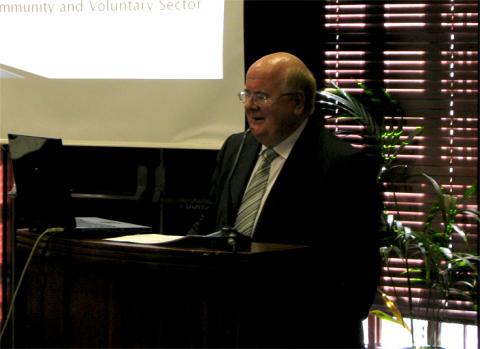'Fundamental flaw' in decision-making processes must be addressed

Deliberative processes are key if Ireland is to avoid repeating the mistakes of the past, according to directors of Social Justice Ireland Seán Healy and Brigid Reynolds.
In the keynote address of the organisation’s conference on ‘Sharing responsibility for shaping Ireland’s future’, held last Wednesday (14 September), Seán Healy said: “The crises of recent years have exposed a fundamental flaw in decision-making processes in Ireland and abroad as many people are paying the price for decisions they had no hand, act or part in making. This unjust situation has fuelled a growing conviction among many that public institutions are not up to addressing the challenges of the present moment.
“All sectors of society have a right and a responsibility to be involved in making decisions that impact on them particularly on issues concerning the shape of the future.”
Healy was keen to emphasise the need to address flawed decision-making processes at political, local and corporate levels, and argued that, “We need deliberative processes. They are absolutely essential. Otherwise it’s always going to come down to an issue about power differentials. That needs to be dealt with. All stakeholders should have a real voice.”
Noting the mistakes made and lessons learned from the social partnership process, he observed: “There was no genuine deliberation. There was no genuine engagement. The power differentials were obvious, and they were used. They were used in such a way that vulnerable people were not always protected.”
What is required, according to Healy, is for the Irish Government to move to develop processes locally and nationally to ensure that all stakeholders have a real say in making the decisions that will shape the future.
“At the moment power is exercised by those who are powerful, those who are wealthy, and those who are not don’t get their voices heard. That needs to change,” he said.
“Being wealthy and powerful should not give precedence in the policy-making process to any individual’s or sector’s analysis of the present or their vision for the future.”
Ivan Cooper of The Wheel, who addressed the conference on the subject of community participation and public services, summed up the challenge involved in the idea of sharing responsibility, saying:
“Sharing responsibility in shaping the future is a big theme, about as big as they come. Importantly the theme is expressed in the present continuous and suggests that we are all participating – actively or passively - in shaping the future, whether we are aware of it or not. The challenge essentially consists in each of us accepting our duty to become more actively involved in contributing in whatever way we can to envisioning and sustaining the society that we want to live in. We have delegated that role to professional politicians for too long.”
Also speaking at the conference, Gilda Farrell, Head of Social Cohesion at the Research and Development Division of the Council of Europe, echoed Healy in emphasising the need for genuine deliberation, saying:
“A deliberative approach is essential if we are to see a reduction in the widening gap between, on the one hand, the formal recognition of fundamental principles such as the rule of law, human rights, social justice, social protection of the weakest, and respect for the environment and on the other hand the daily reality where these principles are not applied in practice.”
The conference was also addressed by Danny McCoy of IBEC, David Begg of ICTU, Mary Cunningham of the National Youth Council, and Michael Ewing of the Irish Environmental Network.
Copies of all papers presented are contained in a book entitled ‘Sharing Responsibility in Shaping the Future’. Copies are available from Social Justice Ireland and are priced at €15.
Read the full text of Seán Healy and Brigid Reynold’s paper ‘Why and how should responsibility be shared’ here.
Ivan Cooper’s paper may be accessed here and David Begg’s here.
Image top: Michelle Murphy.
